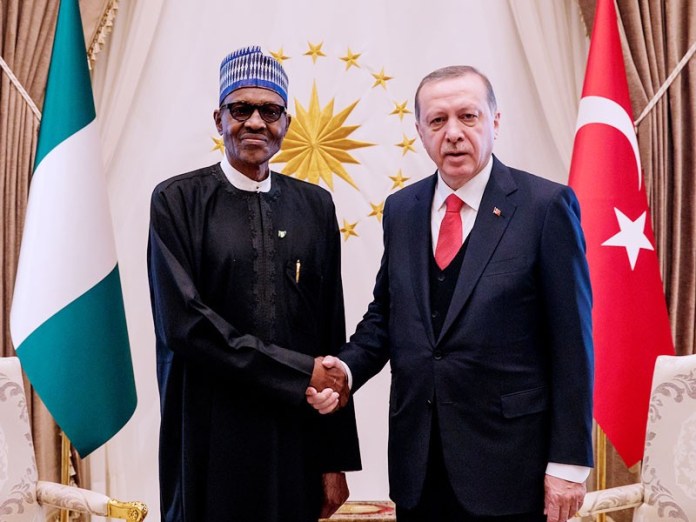- Buhari Strikes Fresh Deal with Turkish President on Counter-terrorism
Presidents Muhammadu Buhari and Recep Tayyip Erdogan thursday in Ankara, Turkey agreed to strengthen cooperation between the security agencies of both Nigeria and Turkey on counter-terrorism.
A statement by the president’s spokesman, Malam Garba Shehu, said Buhari at a joint press conference after talks with his host, said he was ‘‘very pleased’’ that the defence ministers of both countries held extensive discussions on how to develop new strategies for counter-terrorism.
“We are very pleased with the progress of the meeting so far and we are going to wait for the details of meetings between the two countries. We will as a result of the meeting between the ministers and officials of both countries strengthen rapidly whatever their recommendations are,’’ the president was quoted to have said.
Garba said Buhari while commenting on the degradation of Boko Haram in Nigeria, said the improved security situation in the North-east was an eloquent testimony to the efforts of his administration in combating terrorism since he came into office in May 2015
“We were very surprised and disturbed by the claim made by Boko Haram on what they have been getting from ISIS. We know we will be able to contain them and we have proven that we can do it. We are very pleased that Turkey is in a position to assist us and has been strengthening our educational and health institutions,’’ Buhari was further quoted as saying.
The statement added that the two leaders also discussed the prospects of increasing their bilateral trade, which it said had exceeded $779 million in the first eight months of 2017.
“There are a lot of potentialities in terms of investments and a lot is being done in the educational and health sectors in Nigeria. These will be strengthened and I assure you that Nigeria is prepared to accept Turkish business people to come and explore more of Nigeria’s potentialities,’’ the statement quoted the Nigerian leader.
It added that Erdogan in his remarks, said Nigeria had great potentials and remained “a global actor in terms of economy, demographics and its peacekeeping records,” adding that Turkey was interested in investing in Nigeria’s electricity, refineries and gas sectors, observing that increasing the flights between Turkey and Nigeria would further improve commercial and people-to-people relationships.
On the fight against terrorism, Shehu said the Turkish leader added: ‘‘There is no difference between Boko Haram, Fethullah Terrorist Organisation or Daesh (ISIS), which have all killed, inflicted pain and hardship on innocent people.”
In another statement last night, Shehu said Buhari commended the international media for their ‘constructive coverage’ of the July 15, 2016 failed coup attempt in Turkey.
According to him, the president who made the remark at a meeting with the Speaker of the Grand National Assembly of Turkey, Ismail Kahraman, hailed the courage of the people of Turkey for defending democracy in the aftermath of the unfortunate incident of July 15.
“The international media helped the world in trying to understand what really happened (on July 15) and what the government is doing,’’ he said.
Also yesterday, President Buhari in Ankara, laid a wreath at the mausoleum of Turkey’s founding father, Mustafa Kemal Ataturk.
A statement by his spokesman, Shehu, said the president who was accompanied by Nigeria’s Ambassador to Turkey, Iliyasu Paragalda, and other senior government officials, laid the wreath in red and white colours of the Turkish flag at the tomb of Ataturk and later observed a minute silence.
Shehu said the Buhari also signed the official Anitkabir memorial Book of Honour at the Misaki-i Milli Kulesi (National Pact Tower), within the precincts of the mausoleum, and toured the museum.
He said the president wrote: ‘‘It is an honour and privilege to visit Anitkabir, the mausoleum of a great patriotic, visionary and courageous leader who shaped modern Turkey, during my official working visit to Ankara and the ninth D-8 summit in Istanbul.
“I pay my profound respect to Mustafa Kemal Atatürk, founder of the Republic of Turkey and the first President from 1923 until his death in 1938. I am pleased with the friendly relations between Turkey and Nigeria, which has grown in leaps and bounds over the years. I look forward to a more fruitful cooperation between our governments and people in areas of mutual concern and interests, for the benefit of our people.’’


 Naira4 weeks ago
Naira4 weeks ago


 Naira4 weeks ago
Naira4 weeks ago




 Naira4 weeks ago
Naira4 weeks ago




 Naira3 weeks ago
Naira3 weeks ago
 Commodities4 weeks ago
Commodities4 weeks ago


 News4 weeks ago
News4 weeks ago
 Travel4 weeks ago
Travel4 weeks ago




 Naira3 weeks ago
Naira3 weeks ago





















